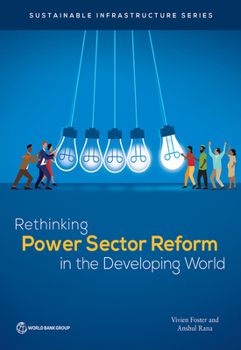Rethinking Power Sector Reform in the Developing World
During the 1990s, a new paradigm for power sector reform was put forward emphasizing the restructuring of utilities, the creation of regulators, the participation of the private sector, and the establishment of competitive power markets. Twenty-five years later, only a handful of developing countries have fully implemented these Washington Consensus policies. Across the developing world, reforms were adopted rather selectively, resulting in a hybrid model, in which elements of market orientation coexist with continued state dominance of the sector. This book aims to revisit and refresh thinking on power sector reform approaches for developing countries. The approach relies heavily on evidence from the past, drawing both on broad global trends and deep case material from 15 developing countries. It is also forward looking, considering the implications of new social and environmental policy goals, as well as the emerging technological disruptions. A nuanced picture emerges. Although regulation has been widely adopted, practice often falls well short of theory, and cost recovery remains an elusive goal. The private sector has financed a substantial expansion of generation capacity; yet, its contribution to power distribution has been much more limited, with efficiency levels that can sometimes be matched by well-governed public utilities. Restructuring and liberalization have been beneficial in a handful of larger middle-income nations but have proved too complex for most countries to implement. Based on these findings, the report points to three major policy implications: First, reform efforts need to be shaped by the political and economic context of the country. The 1990s reform model was most successful in countries that had reached certain minimum conditions of power sector development and offered a supportive political environment. Second, countries found alternative institutional pathways to achieving good power sector outcomes, making a case for greater pluralism. Among the top performers, some pursued the full set of market-oriented reforms, while others retained a more important role for the state. Third, reform efforts should be driven and tailored to desired policy outcomes and less preoccupied with following a predetermined process, particularly since the twenty-first-century century agenda has added decarbonization and universal access to power sector outcomes. The Washington Consensus reforms, while supportive of the twenty-first-century century agenda, will not be able to deliver on them alone and will require complementary policy measures
Format:Paperback
Language:English
ISBN:1464814422
ISBN13:9781464814426
Release Date:December 2019
Publisher:World Bank Publications
Length:356 Pages
Weight:1.89 lbs.
Dimensions:0.9" x 7.9" x 10.4"
Customer Reviews
0 rating





